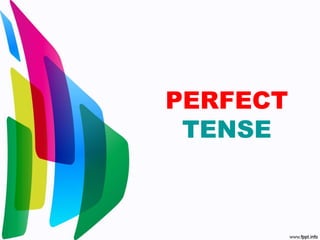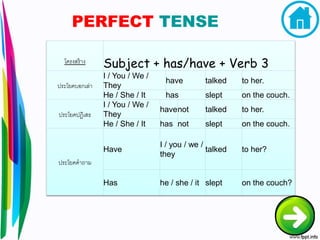tense
- 2. e PERFECT TENSE āđāļāļĢāļāļŠāļĢāđāļēāļ Subject + has/have + Verb 3 āļāļĢāļ°āđāļĒāļāļāļāļāđāļĨāđāļē I / You / We / They have talked to her. He / She / It has slept on the couch. āļāļĢāļ°āđāļĒāļāļāļāļīāđāļŠāļ I / You / We / They havenot talked to her. He / She / It has not slept on the couch. āļāļĢāļ°āđāļĒāļāļāļēāļāļēāļĄ Have I / you / we / they talked to her? Has he / she / it slept on the couch?
- 3. Present Perfect Tense Subject + have,has + V3 + Object. 1. āđāļāđāļāļąāļāđāļŦāļāļļāļāļēāļĢāļāđāļāļĩāđāđāļĄāđāļĢāļ°āļāļļāđāļ§āļĨāļēāđāļāļāļāļĩāļ He has sold his car. (When? We donât know.) 2. āđāļāđāļāļĢāļĢāļĒāļēāļĒāđāļŦāļāļļāļāļēāļĢāļāđāļāļĩāđāđāļāļīāđāļāļāļāđāļāđāļĨāļ°āļŦāļĨāļāđāļŦāļĨāļ·āļāļŦāļĨāļąāļāļāļēāļāđāļāļāļąāļāļāļļāļāļąāļ He has just painted the room. (The paint is wet.)
- 4. 3.āđāļāđāļāļąāļāđāļŦāļāļļāļāļēāļĢāļāđāļāļĩāđāđāļāļīāļāļāļķāđāļāđāļāļāļāļĩāļāđāļĨāļ°āļāļēāđāļāļīāļāļĄāļēāļāļāļāļķāļāļāļąāļāļāļļāļāļąāļ She has lived in this house for 2 years. (She still lives in this house.) BUT : He lived in Australia for one year. (He doesnât live in Australia now.) 4.āđāļāđāļāļąāļāđāļŦāļāļļāļāļēāļĢāļāđāļāļĩāđāđāļĄāđāđāļāđāļāļĨāđāļēāļ§āļāļķāļāđāļ§āļĨāļēāđāļāļāļāļĩāļāđāļāđāđāļāļ·āđāļāļĄāđāļĒāļāļāļąāļāļāļąāļāļāļļāļāļąāļ Iâve met Madonna. (I may meet her again; sheâs still alive. â period of time not finished yet)
- 5. Special points Since is used to express a starting point. For is used to express a period of time. Yet is used in questions and negations. Already is used in statements and questions. Just + Present Perfect Just now + Past Perfect Iâve known Ann since October. Iâve known Ann for 2 months. Have you met him yet? I havenât met him yet. Iâve already posted the letters. Iâve just called the doctor. He left just now āļŦāđāļēāļĄāđāļāđāļāļąāļ non action verbs : love, want, mean, believe . Time adverbs and expression used with Present Perfect : Just, ever, never, always, already, yet, for, since, so far, how long, recently, today, this week/month/year,etc.
- 6. âĒ Text





